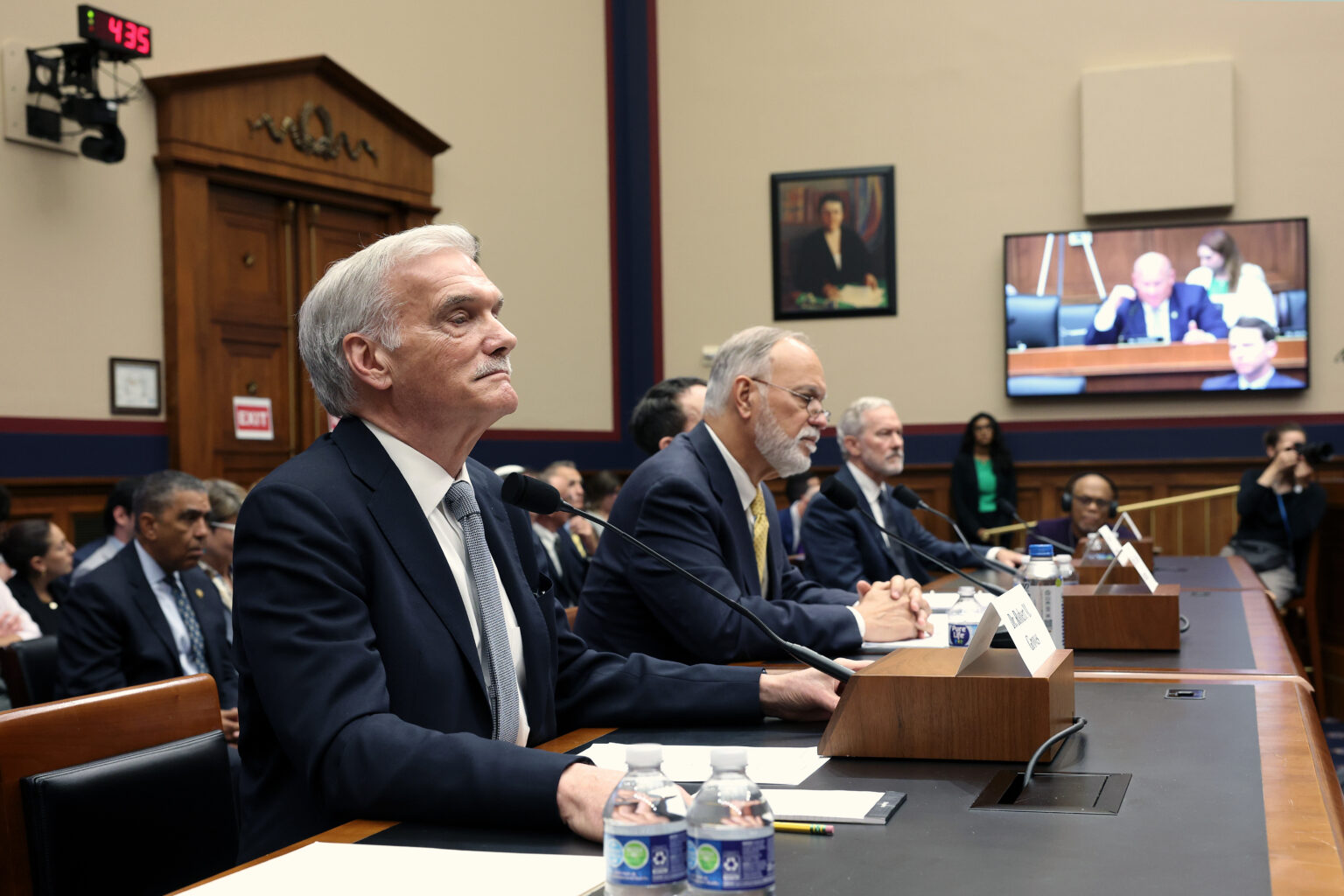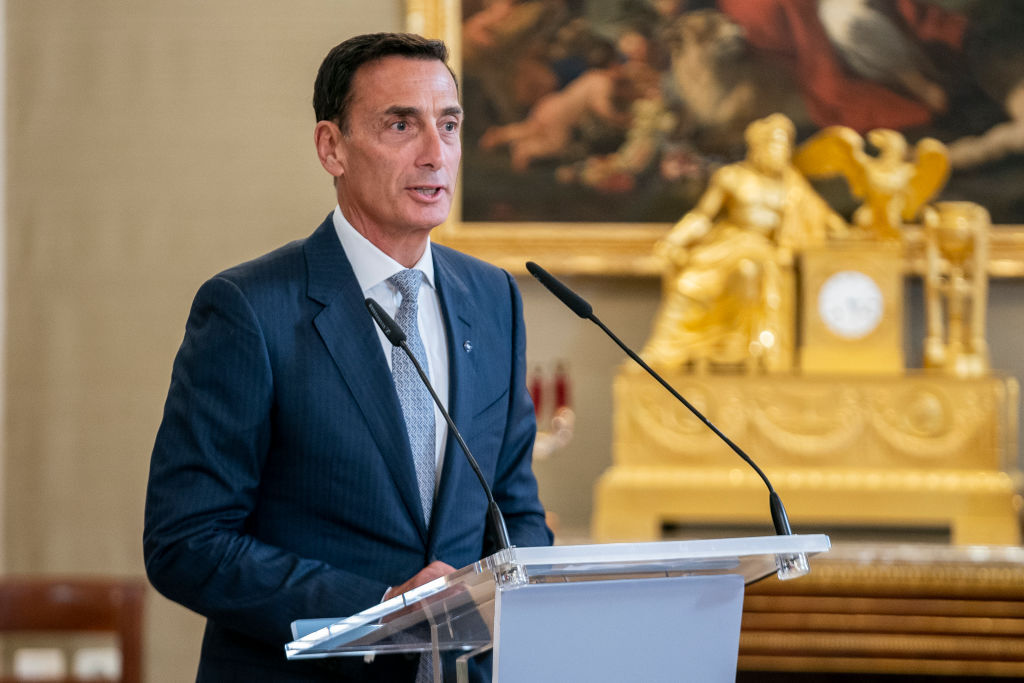Your Daily Phil: Firing interfaith specialist, USCJ signals shift away from accepting ‘mixed marriages’
Good Wednesday morning.
In today’s edition of Your Daily Phil, we look at the emerging fight between Jewish communal organizations and the National Education Association. We examine the Conservative movement’s decision to cut the position of an interfaith family specialist, and report on the steps Columbia University is taking to reach an agreement with the Trump administration on campus antisemitism. We feature an opinion piece by Tomer Samarkandi spotlighting a teacher shortage in Israel and one by Eliana Leader reimagining Jewish retreating for the 21st century. Also in this issue: Andrew Roth, Jonathan Cannon and Francine Wunder.
What We’re Watching
We’re watching the situation along Israel’s border with Syria, which is heating up as the IDF conducts strikes on Syrian targets in retaliation for ongoing regime attacks on Syria’s Druze community. Israel has reportedly struck targets in Damascus, including the Syrian Defense Ministry. Earlier today, dozens of Druze from the Israeli side of the Golan Heights breached the border in an effort to support their besieged coreligionists in the Syrian Golan city of Sweida.
The Friends of the Israel Defense Forces’ national board is scheduled to vote today on a motion to remove the group’s chair, amid emerging reports of mismanagement and other issues. Read more about it here.
What You Should Know
A QUICK WORD WITH EJP’S JUDAH ARI GROSS
Even as college campuses took center stage in the national discussions about rising antisemitism and anti-Israel activism in the wake of the Oct. 7 terror attacks, many Jewish communal leaders were already identifying the situation in K-12 schools as just as worrying.
Just a few weeks after the 2023 terror attacks, Tyler Gregory, CEO of the Bay Area’s Jewish Community Relations Council, told eJewishPhilanthropy that one of his organization’s “biggest takeaways” from the immediate outpouring of antisemitism and anti-Zionism across the U.S. was that “our high schools in particular need a lot more attention.” Ron Halber, who heads the Jewish Community Relations Council of Greater Washington, similarly told eJP back in November 2023 that K-12 schools were seeing an unprecedented “surge of antisemitism… even at the elementary school level.”
The Bay Area and Washington Jewish communities were not alone; federations, JCRCs and advocacy groups across the country have been raising similar concerns throughout the past 21 months and announcing measures to address them.
In recent days, the issue has surged to the fore after the National Education Association — the country’s largest teachers’ union — narrowly passed a resolution, NBI 39, forbidding its members to “use, endorse or publicize any materials from the Anti-Defamation League.”
The measure has been almost universally panned by Jewish organizations, as well as many Jewish members of the union, who immediately decried its passage. And yet while Jewish groups across the political spectrum have voiced opposition to the resolution, the reactions have — yet again — revealed fissures within the American Jewish community.
On Monday, some 400 Jewish institutions — representing the overwhelming majority of the American Jewish community — signed an open letter, written by the ADL, condemning the NEA resolution.
“It is our belief that the goal of those who introduced NBI 39 is to marginalize mainstream Jewish voices within this country’s public school systems and to limit the ability of educators to address the growing threat of antisemitism with their students,” the letter states, noting that the resolution will also affect the ADL’s Holocaust education materials. Signatories include the American Jewish Committee, Jewish Federations of North America, Conference of Presidents of Major American Jewish Organizations, National Council of Jewish Women, Jewish Council for Public Affairs, Orthodox Union, the Conservative movement’s Rabbinical Assembly and Union for Reform Judaism.
The progressive organization J Street notably did not sign the ADL letter — over its position that anti-Zionism is inherently antisemitic — and instead sent its own letter to NEA President Rebecca S. Pringle, expressing opposition to both the resolution and the ADL.
Since sending the letter, the ADL has doubled down on its criticism, with CEO Jonathan Greenblatt writing an opinion piece in The Wall Street Journal decrying the measure and Pringle’s silence on the issue. “[The] NEA’s move is both insidious and vindictive. This wasn’t about the ADL. It was a clear and unambiguous statement to Jewish educators, parents and children: You don’t count. And it perversely takes this stance at a time when anti-Jewish hate is skyrocketing,” Greenblatt wrote, noting that he’d met with Pringle on Monday. “She told me that she heard our concerns, and that the NEA is committed to fighting antisemitism. But she has yet to make a public statement to this end or weigh against this resolution.”
Other organizations, however, have adopted a different approach. JCPA, which signed the initial letter on Monday, followed up with its own missive to Pringle later in the day, which noted that it recently led a workshop on antisemitism at an NEA conference on racial and social justice earlier this month. “We are concerned that NBI 39 serves as a dangerous escalation aimed at delegitimizing a major Jewish organization that provides critical research and resources in the fight against antisemitism. One does not need to align with the ADL on every issue; but choosing to cut off all engagement and dialogue runs counter to our shared goals of countering antisemitism and broader hate and bias,” Amy Spitalnick, the CEO of JCPA, wrote in the letter.
On social media, Spitalnick also decried the emerging fight between the teachers’ union and American Jewish organizations, describing it as counterproductive. “The extreme voices (on both ends of the spectrum) pitting Jews against teachers’ unions only make it easier for this admin to gut public education and our broader institutions & democracy,” she wrote on X. “Division is their core tactic — to undermine the very coalitions we need to fight back.”
DENOMINATION CONSIDERATION
With dismissal of interfaith specialist, Conservative movement appears to backtrack on accepting ‘mixed marriages’

In 2017, the United Synagogue of Conservative Judaism started allowing congregations to accept non-Jewish members. The following year, rabbis were also allowed to attend interfaith weddings. Two years later, interfaith family specialist Keren McGinity was hired as the movement’s first director of intermarriage engagement and inclusion, putting out recommendations to further involve non-Jewish partners in religious life. In February, the movement launched a survey about interfaith marriage, noting that “disapproval has not discouraged intermarriage but instead has discouraged affiliation” from Conservative synagogues and rabbis. To many, it appeared that the Conservative movement was poised to allow its clergy to officiate interfaith weddings. But last month, McGinity was dismissed from her position, eJewishPhilanthropy’s Jay Deitcher has learned, a potential indication that the movement is shifting away from full acceptance of interfaith couples.
Not so fast: While McGinity’s position has been cut, the funding for it remains available, according to Rabbi Ashira Konigsburg, the chief movement strategy officer for USCJ and chief operating officer for the Rabbinical Assembly. The movement may now use that funding for outside consultants instead of a full-time employee. “The work is going to look different depending on what needs to happen,” Konigsburg said. “We want to have the flexibility to staff for the specific things that need to be accomplished.” Shirley Davidoff and Rabbi Aaron Brusso, co-chairs of the Intermarriage Working Group, told eJP that the IWG’s recommendations will come this fall. Until the plan “is ready for launch, it’s not ready for a launch,” Konigsburg said.
CAMPUS BEAT
Columbia takes steps to reach Title VI deal with federal government

Columbia University announced on Tuesday it would implement several measures to confront antisemitism in an effort to reach a deal with the Trump administration to restore the $400 million in federal funding that was cut by the government in March due to the university’s record dealing with the issue, reports Haley Cohen for eJewishPhilanthropy’s sister publication Jewish Insider.
The measures: The steps include the university further incorporating the International Holocaust Remembrance Alliance’s working definition of antisemitism by requiring its Office of Institutional Equity to embrace the definition; appointing a Title VI coordinator to review alleged violations of the Civil Rights Act; requiring antisemitism training for all students, faculty and staff; and refusing to recognize or meet with “Columbia University Apartheid Divest,” a coalition of over 80 university student groups that Instagram banned for promoting violence.
Read the full story here and sign up for Jewish Insider’s Daily Kickoff here.
IT TAKES A VILLAGE
Education must not pay the price of war yet again

Village. Raanan Tal
“According to the Ministry of Education, Israel is short at least 10,000 educators and will need an additional 24,000 by 2026. That number translates to hundreds of thousands of students missing out on consistent instruction in core subjects. This is not a seasonal hiccup but a systemic issue,” writes Tomer Samarkandi, CEO of Village Way Educational Initiatives, in an opinion piece for eJewishPhilanthropy. “Poor conditions and lack of training, fair compensation and public respect deter capable people from entering and/or staying in the profession… Investment in education has been steadily declining, and in the aftermath of war it risks falling even further down on the national agenda.”
Culture shift: “Israel still has thousands of committed educators doing heroic work under difficult circumstances, but they are exhausted — and they are not being replaced. Without fundamental reform, fair pay, professional support and public respect, we risk losing the next generation of teachers entirely. One approach already making a difference is the work of Village Way Educational Initiatives (VWEI), supported by the U.S. based organization Impact Israel. Born out of Yemin Orde Youth Village, VWEI employs a unique educational methodology known as the Village Way, partnering with schools in a three-year process to transform their entire culture and teaching style… VWEI also offers leadership programs, regional seminars and conferences to educators of all levels. These opportunities do more than just promote continued learning — they create a sense of purpose and community, which in turn contribute to overall fulfilment and increased job satisfaction that can help combat the teacher shortage crisis.”
READER RESPONDS
Jewish retreating: A smart investment in Jewish joy and community

“In this moment of rising fear and fractured connection, Jewish joy isn’t a luxury — it’s a lifeline. That’s why Sam Aboudara’s recent call in eJewishPhilanthropy to treat Jewish joy as a ‘communal imperative’ resonates so deeply. He argues that joy is not ancillary to Jewish life but foundational. Immersive experiences like summer camp, he writes, ‘don’t just work — they transform,’” writes Eliana Leader, director of the Kaplan Mitchell Retreat Center at Ramah Darom, in an opinion piece for eJewishPhilanthropy. “[Camp] is our most impactful model across denominations and geography. But if we believe Jewish joy is essential and transformational, then we must ask: Where does that transformational power go when childhood ends?”
A new model: “The closest our community has come to large-scale Jewish retreating for adults and families was the golden era of the Borscht Belt. As Sara Fredman Aeder recently wrote in JTA, the Catskills once provided an immersive cultural space for Jewish leisure and connection. As nostalgic as that era may be, it’s not the model we need now… A modern Jewish retreating movement — call it Borscht Belt 2.0 — must build on what worked and go further: offering intentional, holistic spaces where Jewish joy, literacy, connection and fun are woven together.”
Worthy Reads
Language Land Mines: In The Chronicle of Philanthropy, Matt Watkins explores how the language nonprofits use in their messaging is interpreted (and sometimes misinterpreted) through the filters of today’s cultural divisions. “Polarization isn’t just reshaping national politics. It’s reshaping how nonprofits talk to the people they serve, the partners they need, and the communities they hope to bring together. Every day, strategic plans collapse over a single phrase. Funders and grantees misinterpret each other’s intent. Communications campaigns spark defensiveness instead of support. Strong ideas falter not because the goals are wrong but because the message misses. This isn’t just a matter of tone. It reflects a deeper, more structural issue. Across the country, people are speaking from different moral and cultural maps — and increasingly, they lack the shared language to bridge those differences. Conversations today are often derailed by what I call distortion triggers — words that have stopped functioning as tools and started functioning as tests.” [ChronicleofPhilanthropy]
Privacy, Please: In The Dispatch, Emily Chamlee-Wright encourages support for philanthropic privacy irrespective of one’s personal politics. “Once the state acquires a taste for weaponizing donor lists and suppressing disfavored organizations, it’s unlikely to confine its ambitions to a narrow set of ideological targets… Congress should codify a charitable shield, ensuring that donor information collected by the IRS is never published or shared outside of narrowly defined fraud investigations. Short of federal action, states can pass parallel protections, and governors should veto any bill that ties tax exemption to viewpoint compliance. Emergency powers over nonprofit status ought to be sunsetted on short time horizons, not handed down like an heirloom. Universities and think tanks should teach, without ideological varnish, the lineage from NAACP v. Alabama to the present, reminding students that the civil rights movement depended on anonymous support for the resources that made mass protests possible. Philanthropists can model voluntary transparency about goals and outcomes while still protecting individual supporters, rebutting the claim that privacy equals corruption.” [TheDispatch]
Word on the Street
Lithuania has begun distributing $8.7 million in grants to Holocaust survivors and their families in restitution for assets seized during World War II; the World Jewish Restitution Organization, which helped negotiate the settlement, hailed the move, while several representatives of Lithuanian Holocaust survivors dismissed it as woefully inadequate given the far greater value of the pilfered property…
U.S. Ambassador to Israel Mike Huckabee on Tuesday called on Israel to “aggressively investigate” the death of Saif Musallet, a Palestinian-American man from Florida who was killed by Israeli settlers in the West Bank last Friday in what Huckabee called a “criminal and terrorist act”…
The National Council of Jewish Women and Jewish Women International issued a joint statement denouncing layoffs at the State Department, particularly in its Office of Global Women’s Issues…
New York City Democratic mayoral candidate Zohran Mamdani told business leaders on Tuesday that he would “discourage” the use of the “globalize the intifada” slogan and not use the phrase himself, but said the term was used by many to show support for Palestinians; among the attendees in the 90-minute meeting was Pfizer CEO Albert Bourla, who, according to The New York Times, “pushed Mr. Mamdani about the meaning of genocide and defended Israel’s war in Gaza”…
The Washington Post reports on the recent reunion between a 97-year-old Holocaust survivor, Andrew Roth, and one of the American soldiers involved in the liberation of the Buchenwald concentration camp; the reunion was facilitated by the USC Shoah Foundation…
Twenty Palestinians were killed in a crowd rush at a Gaza Humanitarian Foundation distribution site in Khan Younis, Gaza; the organization said the “chaotic and dangerous surge” was “driven by agitators in the crowd”…
Major Gifts
New England Patriots owner Robert Kraft wrote a check for $10,000 for Texas flood relief after passing a curbside fundraiser in the Hamptons…
Transitions
Veteran Jewish educator Jonathan Cannon was named the next CEO of the Rabbi Sacks Legacy, succeeding Joanna Benarroch, who will become the organization’s president…
Francine Wunder was hired as chief development officer of the Palm Beach County, Fla.-based Ferd & Gladys Alpert Jewish Family Service…
Pic of the Day

Robert Groves, interim president of Georgetown University, Félix Matos Rodríguez, chancellor of the City University of New York, and Rich Lyons, chancellor of the University of California, Berkeley, testify yesterday during a House Committee on Education and Workforce hearing on antisemitism in higher education in the Rayburn House Office Building in Washington.
During the hearing, Lyons defended UC Berkeley’s inaugural chair of Palestinian and Arab studies, Ussama Makdisi, who has celebrated the Oct. 7 terror attacks and said that he “could have been one of those who” carried them out, as a “fine scholar,” reports Jewish Insider’s Gabby Deutch.
Birthdays

Businessman and philanthropist, owner of interests in many Israeli firms (including IKEA Israel) and chairman of Hillel International, Matthew Bronfman…
One of the three co-founders of Comcast Corporation, he served as its chief financial officer and vice chairman, Julian A. Brodsky… Senior U.S. district court judge for the Southern District of New York, Judge Sidney H. Stein… World renowned violinist, violist and conductor, Pinchas Zukerman… President of an eponymous communications firm, public speaker and coach, Betsy R. Sheerr… Co-creator of the first-ever spreadsheet program (VisiCalc), he currently serves as the Chief Technology Officer of Alpha Software, Daniel Singer “Dan” Bricklin… Former high ranking civilian official in the Pentagon during the Bush 43 administration, now a senior fellow at the Hudson Institute, Douglas J. Feith… Senior rabbi since 1997 at Temple Beth Avodah in Newton Centre, Mass., Rabbi Keith Stern… Los Angeles-based attorney, she is the president emerita of the LA chapter of the Jewish National Fund, Alyse Golden Berkley… Past vice chair of the Board of Trustees of The Jewish Federations of North America, Cynthia D. Shapira… British solicitor, he represented Princess Diana in her divorce and Ambassador Deborah Lipstadt in a libel case, Anthony Julius… Pulitzer Prize-winning and Tony Award-winning playwright and screenwriter, Tony Kushner… U.S. ambassador to the EU in the Trump 45 administration, Gordon David Sondland… Former airline executive at Northwest and Delta, now on the board of Spirit Airlines, Andrea Fischer Newman… Former president of Viacom Music and Entertainment Group, Douglas Alan Herzog… Canadian journalist, he worked for CNN International for 30 years, Jonathan Mann… Former Israeli minister of science and technology, now a venture capitalist, Yizhar Nitzan Shai… Chief of staff of the Jewish United Fund of Metropolitan Chicago, Jim Rosenberg… Chicago-based entrepreneur and philanthropist, Victoria Rivka Zell… Former NFL offensive lineman, he is now the president of Collective Mortgage in Colorado, Ariel Mace Solomon… Senior scholar at the Fuchsberg Jerusalem Center, a home for Conservative Judaism in Israel, Rabbi Joshua Kulp… Israeli former professional tennis player, in 2003 she was ranked 15th in the world, Anna Smashnova… Founder of Pinkitzel, a cupcake cafe, candy boutique and gift store located in three Oklahoma cities, Jonathan Jantz… U.S. senator (R-IN) since the beginning of this year, Jim Banks… National political correspondent for The New York Times, Shane Goldmacher… Co-founder of Los Angeles-based Meteorite Social Impact and Health Action Alliance Advisors, Steven Max Levine… White House liaison to the Jewish community in the Bush 43 administration, now managing partner at Arogeti Endeavors, Scott Raymond Arogeti… Features reporter for Jewish Insider, Matthew Kassel… Founder and managing partner at Vine Ventures, Eric M. Reiner… Registered nurse and an internationally board-certified lactation consultant, Chantal Low Katz… Asheville, N.C.-based chiropractor and acupuncturist, Brian Scott Gross…


 Add EJP on Google
Add EJP on Google






